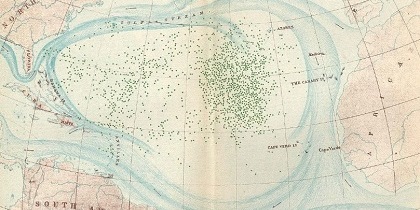
January 30, 2017, by Words on Words
Wide Sargasso Sea and Me
This blog post was written by second year English and Philosophy student, Ayisha Sharma.
I find it impossible to answer the question ‘What’s your favourite book?’. I simply wouldn’t know where to start. But I can answer ‘Which book occupies your thoughts the most?’. Wide Sargasso Sea is the text that haunts me.
Rhys’ post-colonial sketch of Brönte’s ‘mad woman’ oddly strikes a chord with me. I say oddly because, on the surface, the novel’s nineteenth-century Jamaican setting seems a world away from me and who I am. But, as a British-Nepalese woman, my connection with the novel lies in my diasporic identity.
The Sargasso Sea, the only sea without a coastline, can be interpreted as a symbol of suspension and drifting. Such a symbol resonates with the way in which I defined myself as a young child in relation to two contrasting notions: the ‘conservatism’ of my Nepalese origin and the ‘progressiveness’ of Britain. I saw myself as a perplexed agent drifting between these opposing discourses.

Image: Freshwater and Marine Image Bank / CC0 1.0
But, just as assuming that the systematic privilege of being a white woman in Jamaica automatically entails Antoinette’s happiness in Wide Sargasso Sea is grossly simplistic, so too was my view of British and Nepalese ideologies.
I’ve witnessed British politicians claim that same-sex marriage causes flooding and I’ve observed Nepal take steps towards becoming the first South Asian nation to provide constitutional protection for LGBT individuals. I’ve studied intersectional feminism and sociology and I’d like to think I know a little better than before. I’d like to think I’m on solid ground.
Yet when I return to Nepal, I see my step-mother being admonished for failing to attend to guests while she is busy feeding my step-brother. The justification given for such unfair treatment is that servile women constitute an integral aspect of Nepalese culture. Given my Nepalese roots, such culture is also embedded, in part, in me. And I’m drifting again, unsure of exactly who I am.
I suppose this is where much of the struggle lies. In Rhys’s novel, Antoinette is hated by white characters for her Creole background and hated by black characters for her ancestral tie to slavery. She thus occupies a liminal space in which Self and Other become confused. While I’ve thankfully never known hatred, I’ve also found it difficult to differentiate what exactly constitutes Self and Other.
I sometimes catch myself othering the very place I’m told I belong, whether it’s the traffic-heavy, dust-clad roads of the Kathmandu valley or the lush green hills that cushion it on every side. To echo Rhys’ Rochester, Nepal is “a beautiful place”, but the beauty is elusive, consisting in a “secret” that perhaps “I [will] never know”.[1]

Image: Pixabay / CC0 1.0
Ayisha Sharma
[1] Jean Rhys, Wide Sargasso Sea [1966] (London: Penguin, 2000), pp. 54, 111.
No comments yet, fill out a comment to be the first

Leave a Reply